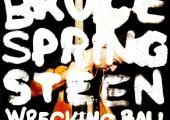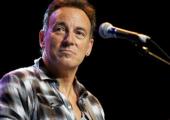When Clarence “Big Man” Clemons, the E Street Band’s charismatic saxophone player, died of stroke-related complications this time last year, there were those among us who wondered if we’d ever see the band together again. His on-stage interplay with Bruce Springsteen seemed to have become even more central to the greatest rock'n'roll show on earth since the band reformed proper in 1999, even if the knees that supported that magnificent frame could no longer hold out the length of shows that regularly topped the three-hour mark. That this year’s Wrecking Ball tour proudly bore the E Street name was something of a relief in that respect; that the tour itself has not failed to pick up glowing reviews as it travelled mainland Europe even more so.
That isn’t to say that the spectre of the Big Man didn’t loom as heavy over the Etihad as the cloud cover - “My City of Ruins”, hometown lament turned post-9/11 tribute, became something else entirely as the crowd roared its agreement to Springsteen’s “are you missing anybody?” refrain. There was only ever one person who could step into Clemons’ shoes: as his nephew Jake stepped forward to perform his first sax solo of the night the "Wee Man" proved that the reason why had as much to do with skill as sentimentality.
Away from the politics, those looking to forget the hard times had plenty to dance about
Sentimentality, as anybody who has ever had the privilege of seeing the E-Street Band’s live show will tell you, is not something that the Boss has ever shied away from: 30 songs culled from a career spanning 40 years neatly demonstrated rock music at its most powerful and transformative but also at its most schmaltzy and sheer fun. There’s a reason these stadium shows continue to attract an audience that has been there since the beginning - as well as, increasingly, their children and grandchildren: the boy plucked from the crowd to count the band back in on “Waiting on a Sunny Day” kept the rain clouds at bay for at least another half hour, and will doubtless remember it for the rest of his life.
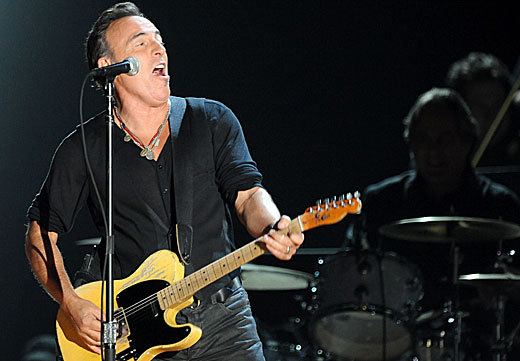 Both the bombast of “Badlands” and “No Surrender”, the night’s opening double-header, and great storytelling songs like “Atlantic City” and “The River”, showed how relevant Springsteen’s earlier material remains today. A devastating “Jack of All Trades”, the song from the new album that most closely parallels the latter in structure and message, received as rapturous a reception as any of the old favourites as its writer re-established the importance of the protest song for a whole new generation.
Both the bombast of “Badlands” and “No Surrender”, the night’s opening double-header, and great storytelling songs like “Atlantic City” and “The River”, showed how relevant Springsteen’s earlier material remains today. A devastating “Jack of All Trades”, the song from the new album that most closely parallels the latter in structure and message, received as rapturous a reception as any of the old favourites as its writer re-established the importance of the protest song for a whole new generation.
Away from the politics, though, those looking to forget the hard times that have tightly squeezed old industrial heartlands on both sides of the Atlantic had plenty to dance about.The addition of a four-piece horn section and Cindy Mizelle’s gospel vocals entreating a packed stadium to “stand up and be counted tonight” made the southern rock elements that have always been prominent in Springsteen’s work even more apparent. There was also a treat in store for hardcore devotees in the form of the full Darkness on the Edge of Town-era intro to “Prove it All Night”, complete with piano and squealing guitars. Before “Land of Hope and Dreams” rolled around to present a magnificent set closer, it was no wonder the 62-year-old performer was hamming up exhaustion flat on his back on stage, a mischievous Little Steven only too happy to revive him with his “magic” sponge soaked in water.
At least, that’s where anywhere else would have ended the night - but the E-Street Band had another hour left in them. Jumping on top of the piano Springsteen performed what can only be described as the world’s most ineffectual strip-tease (damn those sleeves!) to reveal a Born in the USA-era grey t-shirt and taunt the newly falling rain with a celebratory sing-along “Thunder Road”. “Dancing in the Dark” saw two female audience members pulled from the crowd to recreate their own Courtney Cox-style fantasies and a riotous, ridiculous cover of “Twist and Shout” provided a magnificent finale.
But just before the end, there was a proper memorial to a missing family member. After introducing the second verse of “Tenth Avenue Freeze Out”, the song that mythologises the first meeting between Springsteen and Clemons, as the important part, the frontman silenced the band while the crowd went wild for a minute-long montage of the Big Man as they remembered him best. It was Springsteen at his most sentimental, sure, but in that moment it was the perfect tribute - and the perfect conclusion to an incredible night.
Overleaf: "Prove It All Night" gets the '78 treatment in Barcelona, earlier on this tour
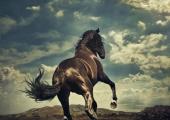

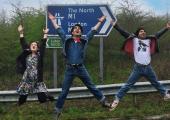

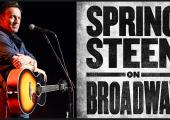

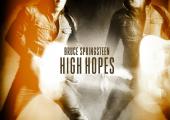
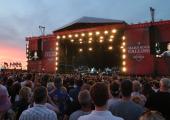
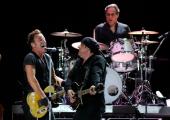
 Both the bombast of “Badlands” and “No Surrender”, the night’s opening double-header, and great storytelling songs like “Atlantic City” and “The River”, showed how relevant Springsteen’s earlier material remains today. A devastating “Jack of All Trades”, the song from the
Both the bombast of “Badlands” and “No Surrender”, the night’s opening double-header, and great storytelling songs like “Atlantic City” and “The River”, showed how relevant Springsteen’s earlier material remains today. A devastating “Jack of All Trades”, the song from the 